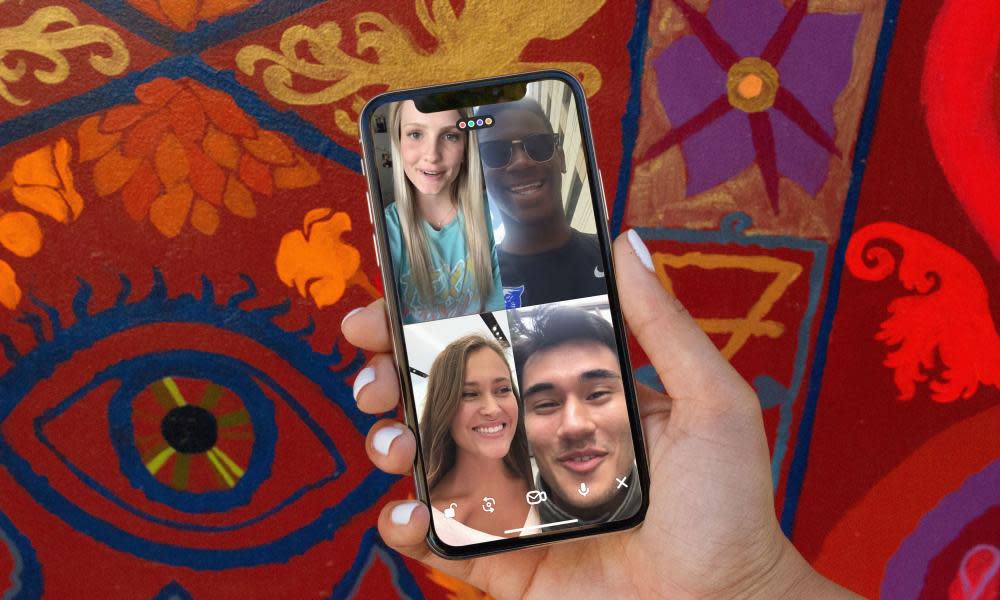Royals, ministers or even Boy George: Houseparty becomes isolation app of choice

Like any real-life get-together, you can never be sure who you will bump into in the kitchen – and in much the same way people are now discovering government ministers, famous musicians, and even members of the royal family when using the Houseparty app.
While Zoom has quickly risen to prominence for business meetings, and Microsoft’s Teams function is being rolled out by many large firms, it is Houseparty that is becoming the place for the nation to socialise.
As a result the service, which allows up to eight people to share the same chat and hop uninvited between mutual friends’ conversations, has been transformed in the space of a few weeks into a venue where the public stand a chance of inadvertently bumping into notable figures.
“The great joy of Houseparty is that you can just crash any group gathering you wish,” said the magician and YouTuber Archie Manners. “I saw that a mutual friend was having a Houseparty with someone called Boy George and assumed that was someone using a nickname. I opened it up and had an hour with Mr Karma Chameleon himself. We chatted about self-isolation and music.”
At least four serving cabinet ministers are on the app, including the tech-obsessed health secretary Matt Hancock, currently self-isolating with coronavirus. Keir Starmer, the frontrunner to become the next Labour leader this weekend, has also been spotted on the service, along with many Labour frontbenchers.
Related: The best chat apps for your coronavirus quarantine – ranked!
A spokesperson for David Cameron would not comment on suggestions the former prime minister had been spotted on the service, although Labour’s one-time communications chief Peter Mandelson has an account.
Real royalty has also been spotted. The Daily Mail has reported that the Duchess of Cornwall has been using Houseparty to keep in touch with her grandchildren while in self-isolation at Balmoral. The newspaper quoted a royal source saying the app was a “brilliant way of staying in touch with her own family whom she is missing terribly”.
As a result Houseparty, launched in 2016 but until recently seen a product for teenagers, is enjoying an unexpected second life, becoming the most-downloaded free app in the UK on both the Android and Apple iOS smartphone stores. Data from the monitoring firm App Annie suggests installations by British users increased 1,120% in March compared with February.
A similar pattern has been seen around the world, with usage jumping after a pandemic-enforced lockdown is imposed. Although Houseparty is owned by Epic Games, the parent company of Fortnite, it does not show any adverts and its simplicity is part of its appeal.
Its growth has been boosted by the way it encourages users to upload their phonebooks and then search for contacts already on the app. This has resulted in people having Houseparty contact lists that combine real-life friends, business contacts and work colleagues in a high-risk mix.
Related: Coronavirus and app downloads: what you need to know about protecting your privacy
With ongoing conversations set to public by default, users are already reporting anxiety caused by ex-partners gatecrashing chats and the delicate social etiquette involved in their bosses joining late-night group conversations – although there is always the option to “lock” a room and avoid interlopers joining.
Houseparty’s growing pains have brought its own problems, with a viral rumour spread earlier this week that its user data had been hacked. The service said this was a malicious smear campaign and offered $1m to anyone who could prove an attack had taken place.
Its ability to break down social boundaries has been particularly appealing to many on the left of politics, with James Meadway, a former economic adviser to the shadow chancellor John McDonnell, approvingly describing it as a “chaos agent”.
Tina Daheley, a BBC journalist who presents the Beyond Today podcast and many news bulletins, said she had downloaded the app last week and mainly used it to chat and play games with her friends.
“On Friday I joined Houseparty and had a catchup with wine and three girlfriends, then the same on Saturday lunchtime with a couple of other friends. What’s really nice is they’re a load of my oldest schoolfriends, and realistically we don’t see each other that often but we had a proper catchup.”
She’d found it harder to get her 71-year-old parents on to the service and remained mildly concerned about the prospect of her bosses being able to jump into the conversation.
“The idea of an editor from BBC News accidentally joining in is terrifying,” she said.
But there is one group who may be less delighted by the surge of interest in the app: its original teenage users. What was once a youth-focused space well away from adults is now overrun with middle-aged parents arranging virtual drinks parties with their friends, all suddenly able to keep an eye on what their offspring are up to.

 Yahoo News
Yahoo News 
